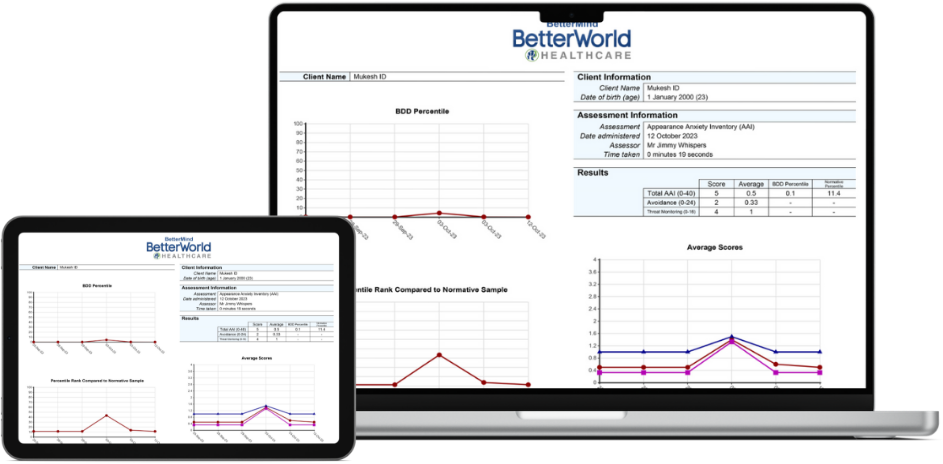Brief-COPE (Brief-COPE)
Assessments
Description
The Brief-COPE is a 28 item self-report questionnaire designed to measure effective and ineffective ways to cope with a stressful life event. “Coping” is defined broadly as an effort used to minimize distress associated with negative life experiences.
The scale is often used in health-care settings to ascertain how patients are responding to a serious diagnosis. It can be been used to measure how someone is coping with a wide range of adversity, including a cancer diagnosis, heart failure, injuries, assaults, natural disasters and financial stress.
The scale can determine someone’s primary coping styles as either Approach Coping, or Avoidant Coping. In addition, The following subscales are reported: Self-distraction, Active coping, Denial, Substance use, Use of emotional support, Use of instrumental support, Behavioral disengagement, Venting, Positive reframing, Planning, Humor, Acceptance, Religion, & Self-blame.
Validity
The Brief-Cope was developed as a short version of the original 60-item COPE scale (Carver et al., 1989), which was theoretically derived based on various models of coping. The BreifCope was initially validated on a 168 participant community sample whom had been impacted by a hurricane (Carver, 1997), and shown to have adequate factor structure.
Subsequent factor-analysis (Eisenberg et al., 2012) with heart failure patients indicated two major factors:
1. Avoidant Coping.
2. Approach Coping.
Homur and Religion subscales did not exclusively load on either of the above factors and are therefore not included in either.
Interpretation
Scores are presented for the two overarching coping styles:
1. Avoidant Coping, which is characterised by the subscales of denial, substance use, venting, behavioural disengagement, self-distraction and self-blame. Avoidant Coping is associated with poorer physical health among those with medical conditions. Compared to Approach Coping, Avoidant Coping is shown to be a less effective at managing anxiety.
2. Approach Coping is characterised by the subscales of active coping, positive reframing, planning, acceptance, seeking emotional support, and seeking informational support. Approach Coping is associated with more helpful responses to adversity, including adaptive practical adjustment, better physical health outcomes and more stable emotional responding.
As well as raw scored being presented for Avoidant and Approach Coping, percentile ranks are presented using normative data from a heart-failure sample (Eisenberg et al., 2012) to indicate the relative preference to coping compared to others experiencing adversity.
Scores are also presented for each of the following subscales.
– Self-distraction, items 1 and 19 (Avoidant)
– Active coping, items 2 and 7 (Approach)
– Denial, items 3 and 8 (Avoidant)
– Substance use, items 4 and 11 (Avoidant)
– Emotional support, items 5 and 15 (Approach)
– Use of informational support, items 10 and 23 (Approach)
– Behavioral disengagement, items 6 and 16 (Avoidant)
– Venting, items 9 and 21 (Avoidant)
– Positive reframing, items 12 and 17 (Approach)
– Planning, items 14 and 25 (Approach)
– Humor, items 18 and 28 *
– Acceptance, items 20 and 24 (Approach)
– Religion, items 22 and 27 *
– Self-blame, items 13 and 26 (Avoidant)
*Humor and Religion are neither Approach or Avoidance coping
Developer
Carver, C. S. (1997). You want to measure coping but your protocol’too long: Consider the brief cope. International journal of behavioral medicine, 4(1), 92-100.
Try it and see how BetterMind can enhance your practice

Support
Frequently Asked Questions
You’ve got questions, we’ve got answers. Below you can find answers to some of the most frequently asked questions. If you can’t find the answer you’re looking for, please feel free to reach out to us at info@betterworldhealthcare.com.
I can’t open test results within the Web Browser
Assessment result PDFs are opened in a new tab within the web browser. If you click the results but they do not open, your browser will be blocking the popup. To resolve this, after you have pressed the test result, look out for an alert at the top of your browser notifying you that a pop-up has been blocked, then click "Allow".
I have forgotten my password. How can I reset it?
If you have forgotten your password please press “forgot password” within the app, or on the Web Browser App login page (https://app.bettermind-app.com/login). You will receive a new temporary password via email.
Can a Practitioner access BetterMind from their Smartphone?
No, A Client /Patient can answer assessment questions on a smartphone but the Practitioners/ Users can't administer BetterMind using a Smartphone. A computer, laptop or tablet will have to be used.


